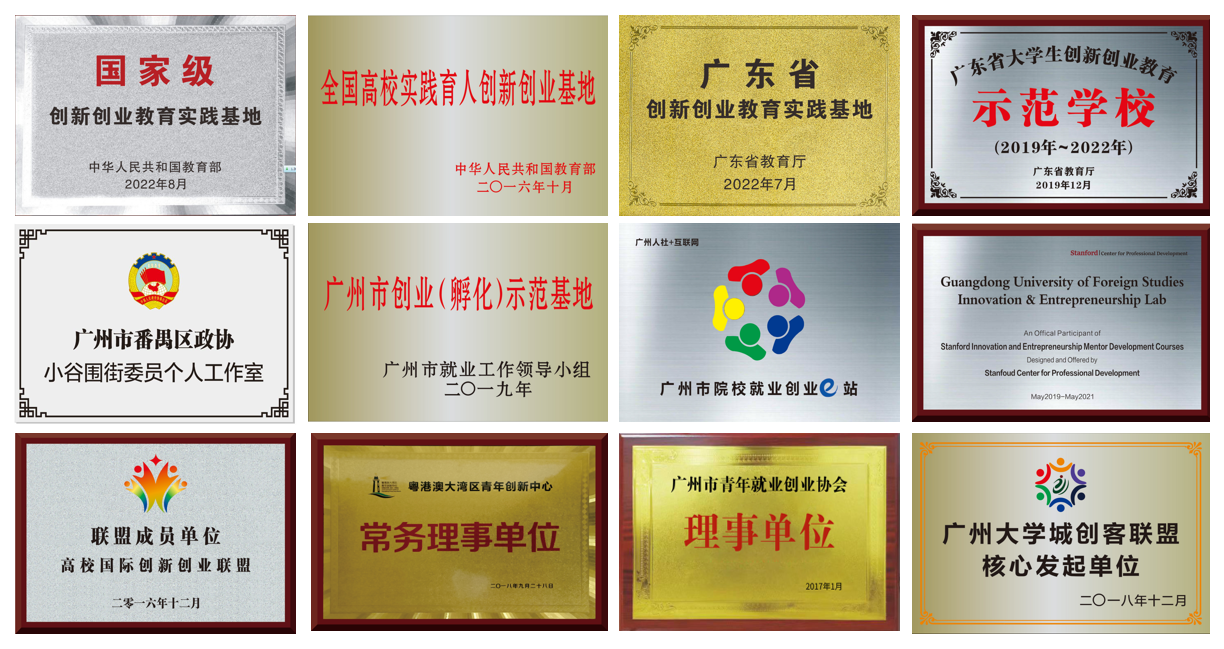
一、创业学院简介
广东外语外贸大学创新创业学院(简称“创业学院”)于2016年7月揭牌成立,2023年4月,创业学院转入商学院。创业学院与广东大学生创新创业教育研究中心合署办公。学院院长由分管创业就业工作校领导兼任,设常务副院长、副院长、教研室主任、行政秘书等人员,履行学校创新创业的“教育教学、实践训练、科学研究、社会服务”四项职能,全面推进学校创新创业教育工作。
创业学院立足于学校“双高”(思想素质高、专业水平高)、“两强”(跨文化交际能力强、实践创新能力强)的人才培养目标,以服务国家“双创”战略为使命,以建设成华南地区国际化特色鲜明的创新型人才培养基地、创新创业研究高地和社会服务机构为愿景,以“广植双创因、外树百业兴”为理念,打造课程教学、实训实践、平台基地、支撑保障为一体的创新创业教育生态链,全面提升学生的创新精神、创业意识和创新创业能力。
二、学院职能
(一)教育教学:推动创新创业教育与专业教育有机融合,构建完善的创新创业课程体系,将创新精神、创业意识“内嵌”到本科人才培养的全过程,融入人才培养目标,使创新精神和创业意识作为教育基因植入全体大学生的知识和能力体系。
(二)实践训练:负责学校创新创业实践和孵化基地的建设;负责学生创新创业实践项目和创业团队的管理、指导与服务;组织开展创新创业大赛和活动,营造良好的创新创业氛围;负责学生创业培训、职业技能培训与鉴定等工作。
(三)科学研究:开展创新创业教育学术研究,撰写创新创业论文及研究报告,组织申报各类创新创业课题,积极参与创新创业教育学术会议和论坛,为创新创业教育的理论研究和交流搭建平台。
(四)社会服务:整合政府、高校、企业校友的创新创业资源,发挥平台优势和教学特色,强化科研成果转化,为创新创业师资、学生团队、社会企业等提供培训、咨询等服务。发挥智库功能,为政府和高校提供战略咨询和决策支持。
三、学院荣誉
目前,学校是国家级创新创业教育实践基地、全国高校实践育人创新创业基地、广东省创新创业教育实践基地、广东省大学生创新创业教育示范学校、广州市创新创业(孵化)示范基地、广州市院校就业创业e站、斯坦福大学创新创业师资课程中心华南地区首所合作共建高校、粤港澳大湾区青年创新中心常务理事单位、广州大学城创客联盟核心发起单位。

About the College

The College of Innovation and Entrepreneurship Education was founded on November 7, 2016. The college is committed to maintaining a global outlook, offering immersive and open education, exploring new models for teaching innovation and entrepreneurship, and promoting innovation and entrepreneurship more generally.
With these broad commitments in mind, the college actively pursues four sets of goals. The first includes developing a curriculum that imparts core knowledge, general knowledge, and particulars about the field; developing courses that are incorporated into all students’ compulsory coursework; raising awareness of entrepreneurship; encouraging innovation; and cultivating an entrepreneurial spirit. The second set of goals includes building an innovation and entrepreneurship laboratory (52000 m2), 10 “incubator” centers, a training base (4895 m2), an entrepreneurship “incubator” (930 m2), and 6 off-campus accelerated-learning programs—all these facilities to provide students with multi-level support in their entrepreneurial pursuits. The third set of goals includes crafting policies supporting entrepreneurship, implementing a flexible academic credit system and intercollegiate credit transfer system, instituting an innovation and entrepreneurship scholarship system, and preserving the rigors of the college’s entrepreneurship training system. The fourth set of goals includes strengthening teacher training by offering an innovation and entrepreneurship training course, hosting a lecture series featuring authoritative guest speakers, devising plans that support scholarly pursuits and that bring seasoned entrepreneurs into the classroom (for example to give lectures), recruiting authoritative experts in the field to instruct and mentor students, and ensuring the cultivation of qualified teachers in the field.
Guangdong University of Foreign Studies is currently Guangdong Province’s official college model of innovation and entrepreneurship education. In addition, it is home to the office of the secretary general for the Professional Entrepreneurship Committee (under the Guangdong Association for Employment Promotion) as well as to a number of other entrepreneurial facilities. These include the University Student Innovation and Entrepreneurship Service Center (endorsed by the Guangdong Science and Technology Bureau), the Guangzhou Entrepreneur Demonstration Center, the Guangzhou Women’s Entrepreneurship Training Center, the Guangdong Communist Youth League’s “Youth Space” Commission, the Guangzhou Youth Employment and Entrepreneurship Guidance Workstation Commission, and the Guangdong University Innovation and Entrepreneurship Research Center.



